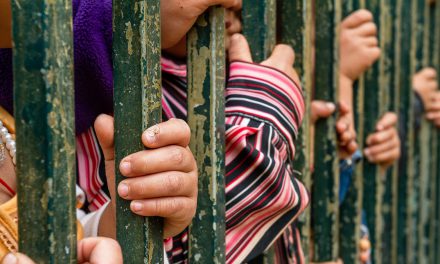National Family Caregivers Month was recently observed to raise awareness about the unfortunate reality of the rewarding role of caring for a loved one. Caregiving for someone living with Alzheimer’s disease or other forms of dementia is an unpaid, thankless job – those living with dementia may never understand the full sacrifice made by their friends and family. However, a new report by the Alzheimer’s Association revealed that while Black (71%) and Hispanic Americans (68%) make up the highest percentage of caregivers, adopting the role is a natural and expected responsibility.
The Alzheimer’s Association provides an annual Facts and Figures report detailing national statistics on Alzheimer’s, including the financial and emotional impact on caregivers. This year, for the first time, the accompanying Race, Ethnicity, and Alzheimer’s in America special report examined the experiences of various races and ethnicities in regard to Alzheimer’s and dementia care. Survey findings revealed Black and Hispanic Americans expect and experience more barriers than White Americans when accessing dementia care, among other concerns.
Although White survey respondents overwhelmingly reported fearing the onset of Alzheimer’s and dementia, as well as the burden of caregiving, Black and Hispanic Americans believe that severe cognitive decline is a natural part of aging. However, early intervention and preventive measures are necessary to reduce the risk of Alzheimer’s and other dementia. This is especially true for Black and Hispanic Americans, as they are at highest risk of dementia due to high rates of blood pressure and other health concerns.
While families may willingly accept the responsibilities of caregiving, it’s critical that they also have the tools and education to help their loved ones live longer, safely, and more independently. Jill Cigliana serves as program director at Memory Care Home Solutions (MCHS), a dementia support organization serving the St. Louis, Mo. and Metro East area.
Cigliana oversees all services, education, and outreach provided to people living with dementia and their care teams. Her prior experience working with older adults as an occupational therapist (OT), as well as family experiences with dementia and brain decline, sparked her passion for supporting caregivers.
“I saw firsthand that family members truly sacrifice their lives, and often their own health, to provide care at home,” she said. “Because dementia affects the mind, people with brain diseases usually cannot even thank the family members or fully appreciate the sacrifice that people are making. Caregiving is the world’s most challenging 24-hour, seven days a week job. It comes with no training or support, yet family members willingly accept the role.”
Dementia Outreach and Care for Black and Hispanic Americans
To best serve Black and Hispanic families navigating dementia, as it relates to both those living with dementia and their caregivers, providers must take a family-centered approach. Black and Hispanic Americans strongly value family and seniors are more likely to live at home. Due to medical mistrust among both groups, they are also less likely to seek care, especially for cognitive decline which many consider a normal part of aging.
The result? Families aren’t aware of the risk factors their loved ones possess and seniors slip into dementia before caregivers can properly intervene. To prevent this, providers like the staff at MCHS focus on providing education as well as safety support to ease transitions between abilities as the person’s cognitive functions decline.
While working as an OT, Cigliana noticed that traditional health care settings don’t always meet the needs of their patients or their support systems. In contrast, she frequently referred older patients to MCHS because of her admiration for their work. “I just deeply respected the mission of MCHS,” she said. “That’s when I decided, ‘I better ask if I can join the team.’”
The mission of MCHS is to extend and improve time at home for people living with dementia and their families, with an emphasis on keeping families together. Providers like Cigliana recognize that families are the primary source of support and aim to set them up for success. Because barriers to dementia care in Black and Hispanic communities are often a result of lack of awareness, MCHS is dedicated to providing much-needed dementia-capable services.
Dementia-capable services are:
- Skilled at identifying people with Alzheimer’s disease and dementia.
- Knowledgeable about the kinds of services that can help people with dementia and their caregivers.
- Able to provide resources and connections to other agencies and community organizations that can help.
In Black and Hispanic families, the belief that cognitive decline is normal may unknowingly prevent signs and symptoms of dementia from being recognized. Initial changes that occur include difficulty planning, such as managing finances, preparing meals, or driving. “These are things you can’t really see by looking at a person,” Cigliana said. “You can’t see that someone isn’t paying their bills on time, or is double paying some bills yet forgetting to pay others.”
In fact, disease progression may not be obvious until it’s too late. Difficulty performing tasks and struggles with memory may result in kitchen fires and fender benders, among other safety concerns. While some symptoms of Alzheimer’s and dementia mimic normal aging, it’s important to know the 10 warning signs. Changes in mood such as depression or isolation, and especially difficulty bathing and dressing, are signs the disease has progressed.
“Most of the time when people start to be concerned, it’s just worry and isn’t really the start of dementia,” Cigliana said. “But the sooner people take action, the more prepared they can be and the more they can set themselves up for success to continue to live as long and independent of a life as possible.”
According to the Facts and Figures report, one in five Black (21%) and Hispanic (20%) Americans say they would feel insulted if a doctor suggested a cognitive assessment. However, monitoring the brain is critical to dementia care and provides valuable research representing diverse demographics.
Medicare covers an annual wellness exam, one component of which is a cognitive screening to look for brain changes. MCHS encourages everyone at the age of 65 and older to discuss regular screenings to monitor brain activity. The organization works with specialists such as geriatricians and neurologists to do further testing if necessary.
Treating Dementia with Dignity
As brain functions decline, the behaviors of a person living with dementia can become challenging for loved ones, especially family, to navigate. It’s important that caregivers have support through these transitions, not only to ensure the safety and dignity of their loved one, but to care for themselves, too.
To help people with dementia continue living a dignified life as long as possible, Cigliana recommends choosing battles wisely. The easiest and simultaneously most difficult tip for navigating dementia is to surrender arguments. It’s important to remember that although your loved one may say something that isn’t true, or correct, or rational, they aren’t doing so intentionally. Adults use logic and facts to explain and communicate, but people living with dementia can’t always process that information, and arguments can be exhausting.
MCHS helps caregivers practice and roleplay this and other scenarios to prepare them for the oncoming challenges, especially amid tense family dynamics. Some of Cigliana’s most rewarding experiences have been watching families come together united despite the underlying grief of the situation.
“My understanding [of dementia caregiving] has only grown in appreciation,” she said. “We’re in a position at MCHS where we really get to celebrate and validate everything that family caregivers bring to their role. When you celebrate people’s strengths and you stop criticizing the things they’re not doing and stop worrying about the abilities lost to dementia, you find that there are a lot of moments of joy.”
At the core of MCHS’s interventions is educating families on the fact that while we can’t change the person living with dementia, we can change our caregiving approach, the environment around the person, and the activities we expect them to accomplish.
“There’s a lot of beauty in caregiving,” she said. “I don’t mean to paint a rosy picture of dementia – it’s a very difficult, heartbreaking condition to watch somebody’s mind decline. But the gift of it is that when you’ve lost many of your memories and you can’t really plan an hour or a day ahead, the person with dementia is really living in the moment. When families can meet that person and really exist in the present moment together, some pretty awesome connection happens.”
Get the Caregiving Support You Deserve
The Alzheimer’s Association Greater Missouri Chapter and MCHS have partnered with the Missouri Rural Health Association to deliver the Customized Caregiver Training and Relief Program (CCTRP). The CCTRP features two tracks. The Customized Relief Program offered by Alzheimer’s Association Greater Missouri Chapter provides respite and relief for qualified safety equipment and services up to $700; the Customized Training Program offered by MCHS provides caregivers with a blueprint for care, as well as education, community resources, and support.
Throughout the Customized Training Program, MCHS dementia experts:
- Work with the entire family unit to equip care partners with skills and strategies to manage dementia progression at home.
- Help families transform the home (with minor modifications) into a safer environment where the person with dementia can be successful with daily activities.
- Connect families with other community resources to assist in the journey of caregiving.
- Navigate families throughout the entire progression of dementia so that no one has to walk this path alone.
There are only two criteria for eligibility: there must be someone with suspected or diagnosed dementia of any type, and at least one informal care partner to engage in services. Because dementia care is so difficult to access, especially due to the barriers faced by Black and Hispanic communities, MCHS does not require an official diagnosis or a doctor’s referral. Families are welcome to call and ask questions or request to schedule a meeting.
Due to local, state, and federal grant funding, there are very little and often zero out of pocket costs for families. Programs and services are also funded through philanthropy fundraisers throughout the year. Each family is provided with tailored behavioral treatment from a team of social workers and OTs to meet each family’s own priorities and challenges. Medicare covers more intensive services and more frequent meetings with an OT if necessary, as do many other insurance options.
“Most people don’t know that non-drug dementia treatments have been studied and tested as rigorously as pharmaceutical treatments,” Cigliana said. “What we’ve learned through that research is that behavioral interventions are actually more effective than drugs at managing difficult dementia behaviors. But there aren’t many healthcare providers or community organizations offering this type of treatment, so most people go without. We are so fortunate to have this offering in our area.”
MCHS is located in St. Louis, Missouri. and provides St. Louis and the Metro East with in-person and in-home services. Thanks to telehealth, video visits are available to anyone throughout Missouri and Illinois.
To begin services, visit https://memorycarehs.org/contact-us/ and fill out a form; you can expect a call in a day or two. Families and individuals are also welcome to call the office at 314.645.6247 with questions or to schedule an initial meeting. MCHS’s YouTube channel offers caregiving tips as well as a virtual tour of their office, which is a mock home used to demonstrate modifying the home environment for dementia safety.
To learn more about the Caregiver Relief Program and Cigliana’s role with MCHS, listen to her interview for the accessHealth podcast.
Lend a Hand
According to the Alzheimer’s Association, caregivers in Black and Hispanic families especially may be hesitant to ask for help. During National Family Caregivers Month, offer support to a caregiver in your community in one of the following ways:
- Learn: Educate yourself about Alzheimer’s disease – the more you know, the easier it will be to help.
- Build a care team: Organize family and friends who want to help and coordinate tasks.
- Give caregivers a break: Spend time with the person living with dementia to allow their caregiver time to recharge.
- Check in: Many Alzheimer’s and dementia caregivers reported feeling isolated. Be sure to offer support and remind them they aren’t alone.
- Tackle the to-do list: Ask for a list of errands or chores that need to be done.
- Be specific and flexible: Specific offers of support, such as “I’m going to the store, what do you need?” can be more helpful than open-ended offers.
- Help caregivers at the holidays: Offer to help with cooking, cleaning, shopping, or hosting.
- Join the fight: Honor the person living with the disease and their caregiver by getting involved with the Alzheimer’s Association.
Read the Alzheimer’s Facts and Figures Special Report to learn more about dementia care among various races and ethnicities and learn the Alzheimer’s Association’s recommendations to prepare the workforce to care for a diverse population of older adults.
The Family Caregiver Alliance provides resources for caregivers in multiple languages including Spanish, Chinese, and Vietnamese.
Honor a Caregiver
National Family Caregivers Month, observed every November, raises awareness of caregiving issues, helps educate communities, and increases support for caregivers. In coordination with this event, Missouri Department of Health and Senior Services, Division of Senior and Disability Services, is highlighting the Caregiver of the Year Initiative to recognize and honor unpaid caregivers in our Missouri communities.
Do you know someone who puts their life on hold to care for a family member or friend? If so, consider nominating that person for recognition. The Department will honor and celebrate exceptional unpaid caregivers each month by featuring a story and photo on the department’s website.
In December, an overall Caregiver of the Year will be selected. If you would like to nominate someone, complete the caregiver nomination and photo release forms. Send both forms, along with a digital photo of the caregiver, to Melissa.LaNeave@health.mo.gov.








